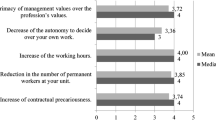Abstract
The article analyzes Post-Soviet academic profession, focusing on thechallenges it has to meet. It starts with the historical overview ofthe higher education and professoriate in Russia and Soviet Union,then gives a general description of the academic profession in Post-SovietRussia. The issues of special interests are the system of academic appointmentsand promotion, remuneration, motivation, evaluation of the faculty,academic freedom. In the context of economic crisis, massification andinternationalization of education, Russian higher education and itsacademic staff face the challenges of adaptation to financial constraints,improving appointment and evaluation procedures, formation of youngergeneration of faculty and many others that are discussed in the article.
Similar content being viewed by others
References
Altbach, Ph.G. (ed.) (2000a). The Changing Academic Workplace: Comparative Perspectives. Boston: Center for International Higher Education.
Altbach, Ph.G. (2000b). 'The deterioration of the academic estate: International patterns of academic work', in Altbach, P.G. (ed.), The changing Academic Workplace: Comparative Perspectives. Boston: Center for International Higher Education, pp. 1-23.
Chinennyi, A. and Stoyan, T. (1999). 'Universitetskie prepodavateli: XIX vek [University faculty in the 19th century]', Vysshee obrazovanie v Rossii [Higher Education in Russia] 3, 128-136.
Clark, B.R. (1998). Creating Entrepreneurial Universities: Organizational Pathways of Transformation. Oxford: Pergamon Press.
Danilova, T. (2001, April). 'Tak skol'ko zhe my zarabatyvaem? [So how much do we earn?]', Novgorodskii universitet [Novgorod University Journal] 15/16, 9-10.
Dobrynina, V.I. and Koukhtevich, T.N. (1993). Sotsial'nye konflikty v vysshei shkole [Social Conflicts in Higher Education]. Moscow: NII VO.
Firsov, B.M. (1998). 'Vosproizvodstvo nauchnoi elity [Reproduction of the scientific elite]', Sotsiologicheskii zhurnal [Sociological Journal] 1/2, 5-14.
Ivanov, A. (2000). 'Uchenye stepeni v Rossiiskoi imperii: istoki i nachala [Academic degrees in imperial Russia: Sources and origins]', Vestnik vysshei shkoly (Alma Mater) [Higher Education Courier (alma mater)] 2, 46-49.
Kinelev, V.G. (ed.) (1995). Vysshee obrazovanie v Rossii: Ocherk istorii do 1917 goda [Higher Education in Russia: Historical Essays up to 1917]. Moscow: NII VO.
Korol'kov, V. (2000). 'Kadrovaya situatsia v vysshei shkole: tendentsii i problemy [Academic staff in higher education: Current tendencies and problems]', Vysshee obrazovanie v Rossii [Higher Education in Russia] 6, 7-19.
Korol'kov, V., Vziatyshev, V. and Romankova, L. (1999). 'Kadrovaia politika v vysshei shkole: Problemy i tendentsii [Staff policy in higher education: Problems and trends]', Vysshee obrazovanie v Rossii [Higher Education in Russia] 2, 7-17.
Krukhmaleva, O.V., Smolentseva, A.Y. and Ushakova, M.V. (2000). Novye obrazovatel'nye uchrezhdenia v Rossii [New Educational Institutions in Russia]. Moscow: NII VO.
Smolentseva, A. (2000, spring). 'Bridging the gap between higher and secondary education in Russia', International Higher Education (19), 20-21.
Rossiiskii statisticheskii ezhegodnik [Russian Statistical Yearbook] (2000). Moscow: Statis-tika.
Russian Statistical Yearbook (2000). See previous entry.
Ushkalov, I. and Malakha, I. (2000). ' "Utechka umov" kak global'nyi fenomen i ego osoben-nosti v Rossii', Sociologicheskie issledovania 3, 110-117. The article is available in English: Ushkalov, I. and Malakha, I. (2000, December). 'The "brain drain" as a global phenomenon and its characteristics in Russia', Russian Education and Society 42(12), 18-34.
Vinogradov, B. (2000). 'Nauchnaya, nauchno-tekhnicheskaya i innovatsionnaya politika sistemy obrazovania [Scientific, technical, and innovative educational policies]', Ves t ni k vysshei shkoly (Alma Mater) [Higher Education Courier (alma mater)] 4, 19-24.
Zhurakovskiy, V., Prikhod'ko, V. and Fedorov, I. (1999). 'Vysshaya tekhnicheskaya shkola na rubezhe vekov [Higher technical education at the turn of the century]', Vysshee obrazovanie v Rossii [Higher Education in Russia] 1, 3-11.
Author information
Authors and Affiliations
Rights and permissions
About this article
Cite this article
Smolentseva, A. Challenges to the Russian academic profession. Higher Education 45, 391–424 (2003). https://doi.org/10.1023/A:1023954415569
Issue Date:
DOI: https://doi.org/10.1023/A:1023954415569




